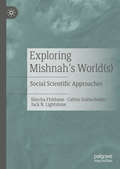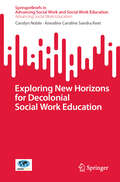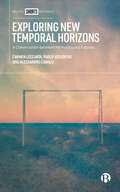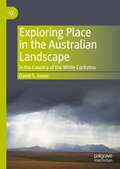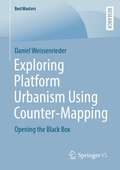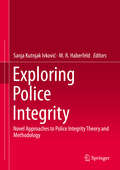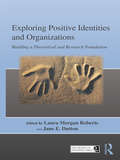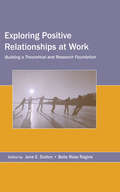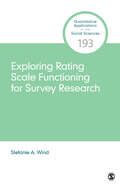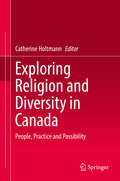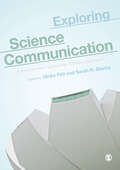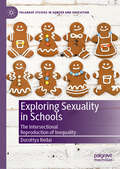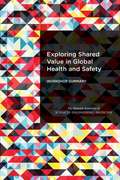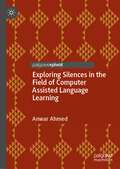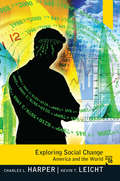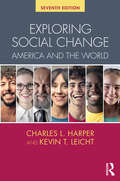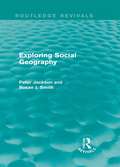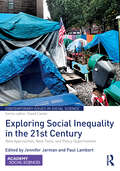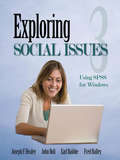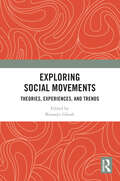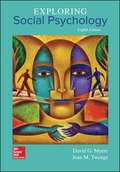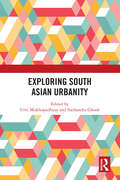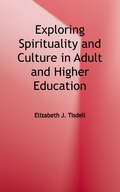- Table View
- List View
Exploring Mishnah's World(s): Social Scientific Approaches
by Calvin Goldscheider Simcha Fishbane Jack N. LightstoneThis book provides a new conceptual and methodological framework the social scientific study of Mishnah, as well as a series of case studies that apply social science perspectives to the analysis of Mishnah's evidence. The framework is one that takes full account of the historical and literary-historical issues that impinge upon the use of Mishnah for any scholarly purposes beyond philological study, including social scientific approaches to the materials. Based on the framework, each chapter undertakes, with appropriate methodological caveats, an avenue of inquiry open to the social scientist that brings to bear social scientific questions and modes of inquiry to Mishnaic evidence.
Exploring New Horizons for Decolonial Social Work Education (SpringerBriefs in Advancing Social Work and Social Work Education)
by Carolyn Noble Annaline Caroline KeetThis book presents current scholarship designed to decolonize, reform and confront the Euro-centric dominance in social work education and practice. This compact volume strings together new content from internationally recognised authors in the field of social work to address this need. Decolonising social work seeks to weaken the effect of colonialism and create opportunities to promote traditional practices in contemporary settings. Its focus is to draw attention to the effects of globalisation and the universalization of social work education, methods of practice and international development that fail to embrace and recognise local knowledges and methods by bringing new and fresh perspectives to social work. It can also be seen as a significant contribution to social work's more critical stance and long-standing struggle to challenge the hegemonic Euro-centric epistemology. With decoloniality becoming a global imperative, this collection brings together case studies from world scholars and decolonial voices in order to explore opportunities, challenges and trends to decolonize through culturally relevant curricula, including: Social Work and Decolonisation: Student Social Workers’ Understanding of the Concepts of ‘Culture’, ‘Cultural Identity’ and ‘Decolonisation’ Developing Curriculum for Criminal Justice Social Work from the Field New Directions in Trauma Work? Cultural Trauma Theory as an Instrument to Contextualise and Address Histories of Pain in Global Communities Analysing and Understanding Intersections: Using Nayak’s ‘Intersectional Model of Reflection’ in Social Work Teaching Decolonizing Social Work Education and Curriculum Utilizing Cultural Competemility and Professionalism Approach Exploring New Horizons for Decolonial Social Work Education is essential reading for practitioners, policy makers, instructors, researchers, and other social work professionals. The book may be used as a supplemental text for social work courses. The national and international focus of the volume will be highly relevant to all social work programmes across the globe.
Exploring New Temporal Horizons: A Conversation between Memories and Futures
by Carmen Leccardi Paolo Jedlowski Alessandro CavalliIn this book, leading sociologists explore how, in our digital age of connectivity, temporal acceleration and real-time simultaneity impact personal experience, relations between generations and institutional processes. The authors analyse the entanglement between past and future and explain how our ability to conceive the future is based not only upon the memory of the past, but also on forecasts about environmental crisis. Bringing memory and future studies into a unique dialogue, they highlight the crucial role of the past elaboration processes in freeing the future from the weight of trauma and renewing the ability to hope. Offering a sophisticated and innovative social theory in a burgeoning field, this is a much-needed intervention to the current ‘temporal crisis’ of social life and sociological debates.
Exploring Place in the Australian Landscape: In the Country of the White Cockatoo
by David S. JonesIncluded is a deep ethno-ecological and cross-cultural translation, that takes the reader through both the Western understanding of sense of place as well as the Australian Aboriginal understanding of Country. Both are different intellectual constructions of thoughts, values and ideologies, but which share numerous commonalities due to their archetypal meanings, feelings and values transmitted to humans.
Exploring Platform Urbanism Using Counter-Mapping: Opening the Black Box (BestMasters)
by Daniel WeissenriederIn recent years, the world witnessed the rise of big digital platforms like Amazon, Airbnb, and Uber. The emerging research field of platform urbanism focuses on these developments and concentrates on platforms and their impact on everyday life in urban space. This book introduces a novel approach to the problems of accessibility and opacity in this area of research. In order to explore the black box platform urbanism more thoroughly, different participatory mapping approaches of critical cartography are examined. The potential of so-called counter-mapping practices and related approaches for a deeper exploration of platform urbanism is discussed. The author thus establishes the nexus between participatory mapping approaches of critical cartography and their application potential for platform urbanism and provides numerous starting points for future research.
Exploring Police Integrity: Novel Approaches to Police Integrity Theory and Methodology
by M. R. Haberfeld Sanja Kutnjak IvkovićThis work provides an innovative new look at police ethics, including results from an updated version of the classic Police Integrity Questionnaire, including new social and technological advances. It aims to push the study of police research further, expanding on and testing police integrity theory and methodology, the relationship between community and integrity, and the influence of multiculturalism and globalization on policing and community attitudes.This work brings together experienced scholars who have used the police integrity theory and the accompanying methodology to measure police integrity in eleven countries, and provide advance and sophisticated explorations of the topic. Organized into three thematic sections, it explores the testing methodology for international comparisons, insights into police-community relations, and explores police subcultures.This innovative book will be of interest to researchers in criminology & criminal justice, particularly with an interest in policing, as well as related fields such as sociology, public policy, and comparative law.
Exploring Positive Identities and Organizations: Building a Theoretical and Research Foundation (Organization and Management Series)
by Jane E. Dutton Laura Morgan RobertsIn the new world of work and organizations, creating and maintaining a positive identity is consequential and challenging for individuals, for groups and for organizations. New challenges for positive identity construction and maintenance require new theory. This edited volume uncovers new topics and new theoretical approaches to identity through the specific focus on positive identities of individuals, groups, organizations and communities. This volume aims to forge new ground in identity research and organizations through a compilation of new frame-breaking chapters on positive identity written by leading identity scholars. In chapters that build theoretical and empirical bridges between identity and growth, authenticity, relationships, hope, sustainability, leadership, resilience, cooperation, and community reputation and other important variables, the authors jumpstart an exciting domain of research on new ways that work organizations are sites of and contributors to identities that are beneficial or valuable to individuals or collectives. This volume invites readers to consider, "When and how does applying a positive lens to the construct of identity generate new insights for organizational researchers?" A unique feature of this volume is that it brings together explorations of identity from multiple levels of analysis: individual, dyadic, group, organization and community. Commentary chapters integrate the chapters within each level of analysis, illuminate core themes and unearth new questions. The volume is designed to accomplish three objectives: To establish Positive Identities and Organizations as an interdisciplinary, multi-level domain of inquiry To integrate a focus on Positive Identity with existing theory and research on identity and organizations To map out a vibrant new research territory in organizational studies . This volume will appeal to an international community of scholars in Management, Psychology, and Sociology, as well as practitioners who seek to generate positive identity-related dynamics, states and outcomes in work organizations.
Exploring Positive Relationships at Work: Building a Theoretical and Research Foundation (Organization and Management Series)
by Building A TheoreticalThis edited volume brings together a select group of leading organizational scholars for the purpose of developing a foundation-setting book on positive relationships at work. Positive Relationships at Work (PRW) is a rich new interdisciplinary domain of inquiry that focuses on the generative processes, relational mechanisms and outcomes associated with positive relationships between people at work. This volume builds a solid foundation for this promising new area of scholarly inquiry and offers a multidisciplinary exploration of how relationships at work become a source of growth, vitality, learning and generative states of human and collective flourishing. A unique feature of the book is the use of a connecting commentator chapter at the end of each section. The Commentator Chapters, written by preeminent scholars, uncover and discuss integrative themes that emerge within sections. The editors approach the topic from multiple levels, each level providing critical, valuable insights into the dynamic process underlying positive relationships at work. These levels are arranged in five parts: an introduction to positive relationships at work; Individuals and Dyads; Groups and Communities; Organizations and Organizing; and a conclusion that offers an engaging invitation and multi-level map for guiding future research. This volume will appeal to academics and practitioners, as well as scholars and graduate students in organizational psychology, management, human resources, and inter-personal communications.
Exploring Rating Scale Functioning for Survey Research (Quantitative Applications in the Social Sciences)
by Stefanie A. WindItems with ordered response categories are common in survey research, such as when respondents are asked how much they agree with certain statements. But how large are the differences between categories of response, and how well do they distinguish between respondents? This volume is the first to introduce the evaluation of rating scales to an audience of survey researchers. Evaluating Rating Scale Functioning for Survey Research provides researchers with an overview of rating scale analysis along with practical guidance on how to conduct such analyses with their own survey data. Author Stefanie A. Wind presents three categories of methods: Rasch models; non-Rasch Item Response Theory (IRT) models; and non-parametric models, together with practical examples. Tutorials, datasets, and software code (R and Facets) to accompany the book are available on the book’s website.
Exploring Rating Scale Functioning for Survey Research (Quantitative Applications in the Social Sciences)
by Stefanie A. WindItems with ordered response categories are common in survey research, such as when respondents are asked how much they agree with certain statements. But how large are the differences between categories of response, and how well do they distinguish between respondents? This volume is the first to introduce the evaluation of rating scales to an audience of survey researchers. Evaluating Rating Scale Functioning for Survey Research provides researchers with an overview of rating scale analysis along with practical guidance on how to conduct such analyses with their own survey data. Author Stefanie A. Wind presents three categories of methods: Rasch models; non-Rasch Item Response Theory (IRT) models; and non-parametric models, together with practical examples. Tutorials, datasets, and software code (R and Facets) to accompany the book are available on the book’s website.
Exploring Religion and Diversity in Canada: People, Practice and Possibility
by Catherine HoltmannThis book is intended for advanced undergraduate and graduate students interested in learning about the many ways in which religious diversity is manifest in day-to-day life Canada. Each chapter addresses the challenges and opportunities associated with religious diversity in a different realm of social life from families to churches, from education to health care, and from Muslims to atheists. The contributors present key concepts, relevant statistical data and real-life stories from qualitative data. The content of the book is supplemented by links to online learning resources including videos, websites and photo essays.
Exploring Science Communication: A Science and Technology Studies Approach
by Ulrike Felt Sarah R. DaviesExploring Science Communication demonstrates how science and technology studies approaches can be explicitly integrated into effective, powerful science communication research. Through a range of case studies, from climate change and public parks to Facebook, museums, and media coverage, it helps you to understand and analyse the complex and diverse ways science and society relate in today’s knowledge intensive environments. Notable features include: A focus on showing how to bring academic STS theory into your own science communication research Coverage of a range of topics and case studies illustrating different analyses and approaches Speaks to disciplines across Media & Communication, Science & Technology Studies, Health Sciences, Environmental Sciences and related areas. With this book you will learn how science communication can be more than just about disseminating facts to the public, but actually generative, leading to new understanding, research, and practices.
Exploring Science Communication: A Science and Technology Studies Approach
by Ulrike Felt Sarah R. DaviesExploring Science Communication demonstrates how science and technology studies approaches can be explicitly integrated into effective, powerful science communication research. Through a range of case studies, from climate change and public parks to Facebook, museums, and media coverage, it helps you to understand and analyse the complex and diverse ways science and society relate in today’s knowledge intensive environments. Notable features include: A focus on showing how to bring academic STS theory into your own science communication research Coverage of a range of topics and case studies illustrating different analyses and approaches Speaks to disciplines across Media & Communication, Science & Technology Studies, Health Sciences, Environmental Sciences and related areas. With this book you will learn how science communication can be more than just about disseminating facts to the public, but actually generative, leading to new understanding, research, and practices.
Exploring Sexuality in Schools: The Intersectional Reproduction of Inequality (Palgrave Studies in Gender and Education)
by Dorottya RédaiThis book explores the place of sexuality in a Hungarian vocational school. Building upon ethnographic research using a post-structuralist and intersectional theoretical framework, the author highlights the voices of teachers and students in their everyday environment and gives them the opportunity to speak about themselves and their experiences: in doing so, addressing a significant gap in the market. The author critically discusses key issues concerning schooling and sexuality, addressing such themes as LGBTQ+ youth and teachers, institutional hierarchy, and the role of sexuality in the re/production of social inequalities through education. Through these topics, she sensitively questions what should be expected of schools in preparing their students for the wider world. The intersectional approach employed by the author will appeal to scholars in a wide variety of disciplines, from gender and sexuality studies to the sociology of education and race and ethnicity studies.
Exploring Shared Value in Global Health and Safety: Workshop Summary
by Engineering Medicine National Academies of SciencesCompanies today are operating in a more complex and competitive environment where traditional models for doing business are no longer sufficient and expectations of business are growing both internally and externally. Many companies have long and robust histories of contributing to their communities as well as to more global societal needs, but this has been done primarily and historically through philanthropy and more traditional corporate social responsibility. However, companies are increasingly seeking greater alignment of these activities with their business interests in order to increase their value proposition. These same companies are also under increased pressure to build their business in a sustainable manner through innovative approaches. The National Academies of Sciences, Engineering, and Medicine convened a workshop to explore the concept of shared value for global health and safety stakeholders in both the public and private sectors; roles, responsibilities, incentives, and opportunities for different stakeholders engaging in global health and safety initiatives in low- and middle-income countries; and the potential of partnerships and collaboration for improved outcomes for all stakeholders, including the communities they serve. Participants considered potential opportunities for creating shared value for all organizations, specifically the creation and impact of shared value through an organization’s core products and services, through employee health and wellness programs, and through community or population health investments. This report summarizes the presentations and discussions from the workshop.
Exploring Silences in the Field of Computer Assisted Language Learning
by Anwar AhmedThis book is an attempt to pay deliberate attention to some silences on issues of social, cultural, and political importance that have remained unattended in the field of Computer Assisted Language Learning (CALL). Using an analytical framework developed by the French philosopher and cultural theorist Michel de Certeau, the author demonstrates how silences can actively shape the boundaries of a scholarly field. He argues that a “geography of the forgotten” in the field of CALL undermines the transformative and social justice potential of language teaching by using digital technologies. The book will appeal to graduate students, teacher educators, and academic researchers who are looking for fresh perspectives and innovative ideas for integrating technologies into the curriculum and pedagogy of language education.
Exploring Social Change: America and the World
by Kevin T. Leicht Charles L. HarperFor one semester junior/senior and beginning-level graduate courses in Social Change. An introduction to social change that highlights theories on key topics including social change, innovation, social movements, and revolutions. Exploring Social Change: America and the World 6e is a comprehensive introduction to social change. The last part of the book shifts explicitly to the global level to analyze population and environmental issues and globalization. Within this framework, the book discusses topics about change and its problems familiar in sociology and social science.
Exploring Social Change: America and the World
by Kevin T. Leicht Charles L. HarperExploring Social Change provides a compelling analysis of theories that explain social change, innovation, social movements, and revolution, and concludes with reflections about how individuals do and should live in an uncertain and rapidly changing world. Written in a personal and clear manner, the authors provide definitions of key terms and analysis of theories and ideas from the study of social change. The seventh edition includes updated examples reflecting the social changes that have occurred in the world around us, including new discussions on the environmental and social landscapes, as well as updated methods and discussions that reflect that changing field of social change study.
Exploring Social Geography (Routledge Revivals)
by Peter A. Jackson Susan J. SmithExploring Social Geography, first published in 1984, offers a challenging yet comprehensive introduction to the wealth of empirical research and theoretical debate that has developed in response to the advent of a social approach to the subject. The argument emphasises the essentially spatial structure of social interaction, and includes a succinct discussion of geographical research on segregation and interaction, which has combined numerical analyses and qualitative ethnographic field research. A distinctive view of social geography is adopted, inspired by the Chicago school of North American pragmatism, but also incorporating the formal sociological theories of Simmel and Weber. Exploring Social Geography will be of value to students of urban geography in particular. However, it will also indicate a wide-ranging and distinctive perspective for all students of the social sciences with a special interest in debates concerning urban, ethnic, racial, anthropological and theoretical issues.
Exploring Social Inequality in the 21st Century: New Approaches, New Tools, and Policy Opportunities (Contemporary Issues in Social Science)
by Paul Lambert Jennifer JarmanIn a world where the effects of inequality occupy an increasingly prominent place on the public agenda, this book provides up-to-date and thorough analysis from the perspective of a group of researchers at the forefront of social stratification analysis. Exploring Social Inequality in the 21st Century is a clear and critical overview of current debates about social inequality. It includes new information, tools, and approaches to conceptualising and measuring social stratification and social class, as well as informative case studies. Throughout, the researchers describe the direct and indirect costs of social inequality. Divided into two parts – Conceptualising and Measuring Inequality; and Costs and Consequences of Inequality in the areas of Education, Employment, and Global Wealth – it includes new findings about the growth of wealth inequality in the G20 countries, and a detailed examination of tax policies designed to reduce inequality without affecting economic growth. With substantial contributions to the analysis of inequalities in education, and explanations of the processes and consequences of social and gender-based exclusion, this book is essential reading for anyone interested in understanding contemporary social inequality. This book was originally published as a special issue of the journal Contemporary Social Science.
Exploring Social Issues: Using SPSS for Windows
by Earl R. Babbie Joseph F. Healey Frederick S. Halley Dr John E. BoliA hands-on introduction to the craft of social research for Introductory Sociology courses, Exploring Social Issues: Using SPSS for Windows, Third Edition puts students in the role of active researchers as they test their own ideas about topics such as divorce, abortion, crime, inequality, prejudice, and television violence using SPSS, the pre-eminent software program in the social sciences. This Third Edition uses updated General Social Survey (GSS) data sets and offers a robust SPSS primer in an appendix. The book is available in two formats: as a stand-alone text, or bundled with SPSS (Student Version). Key Features Stresses active and collaborative learning as students engage in a series of investigative explorations of social issues Shows students how analyzing data from the General Social Survey, a major national research program, can help them better understand compelling social issues Teaches students how to use SPSS as they analyze GSS data on a random sample of the population Guides students step-by-step through exercises that have been designed for those with no background in SPSS Includes research reports that follow a standardized fill-in-the-blank format for analyzing and presenting results, but with space left for students to summarize their results in their own wordsExploring Social Issues: Using SPSS for Windows, Third Edition can be effectively used in Introductory Sociology or other undergraduate sociology courses and may be used in conjunction with most of the standard textbooks in the field. The text is ideal for courses where the professor also wants to introduce students to doing social research and using SPSS.
Exploring Social Movements: Theories, Experiences, and Trends
by Biswajit GhoshThis book introduces the readers to the dynamics of various kinds of social movements. It examines how social movements have become an instrument of social change including assertion of identity and protest against marginalisation. This book describes three major domains – conceptual, experiential, and the impact of globalisation on social movements. The volume begins by locating social movements within broad and contemporary social processes and explores the intrinsic and complex patterns of dynamics among state, market, and social movements from a critical sociological perspective. It explains the meaning, basic features, origins and types, leadership and ideology, and perspectives of social movements and probes into major experiences of eight social movements in India, namely, peasant and farmers, tribal, Naxalite and Maoist, Dalit, working class, women, ethnic, and environmental movements. This book also analyses the role of information technology, media, and civil society in the spread and continuation of such movements. The experiences of queer, new religious, anti-systemic, and anti-displacement movements would also help readers understand how globalisation has offered new avenues of protest to diverse sections of the population. Lessons of anti-globalisation movements across the world provide a futuristic perspective in assessing the strength of social movements in a global society.This book will be useful to the students, researchers, and faculty working in the field of political science, sociology, gender studies, and post-colonial contemporary Indian politics in particular. It will also be an invaluable and interesting reading for those interested in South Asian studies.
Exploring Social Psychology (Eighth Edition)
by David G. Myers Jean M. TwengeExploring Social Psychology succinctly explores social psychological science and applies it to contemporary issues and everyday life. Based on the bestselling text, Social Psychology by David Myers and Jean Twenge, the book presents 31 short modules―each readable in a single sitting―that introduce students to such scientific explorations as love and hate, conformity and independence, prejudice and helping, and persuasion and self-determination.
Exploring South Asian Urbanity
by Suchandra Ghosh Urvi MukhopadhyayThis book looks at the typologies of cities and ideas of urbanity. Focusing specifically on cities in South Asia, it analyses the unique planning concepts, archaeology, art, culture, life, and philosophy of various cities of ancient and modern South Asia. The book explores the concept of urbanity and the idea of an ideal city; it interrogates general notions of urbanity by juxtaposing city life in various periods and geographies of South Asia. By analysing the demography, architecture, rituals, and culture of various cities, it looks at the different spatialities of these places in terms of their size, population, commerce, and philosophy as well as the reasons behind the transformation of these places into urban centres. Drawing from various archeological and literary sources, the volume includes rich details about heterogeneity, rituals, festivals, social stratification, penal systems, famines, and insurrections in ancient cities as well as modern cities like Lahore, Dhaka, and Calcutta, among many others in South Asia. This book will be of interest to researchers and students of ancient and modern history, archaeology, urban studies, urban and town planning, urban sociology, urban geography, cultural studies, post-colonial studies, ancient and medieval architecture, heritage studies, conservation studies, and South Asian studies.
Exploring Spirituality and Culture in Adult and Higher Education
by Elizabeth J. TisdellThis book is written from the unique perspective of teacher, researcher, and author Elizabeth Tisdell who has extensive experience dealing with culture, gender, and educational equity issues in secular adult and higher education classrooms, and formerly in pastoral and religious education settings on college campuses. <p><p>This important book discusses how spiritual development is informed by culture and how this knowledge is relevant to teaching and learning. For educators, an understanding of how spirituality is informed by culture, and how spirituality assists in meaning-making, can aid in their efforts to help their students' educational experiences become more transformative and culturally relevant.
